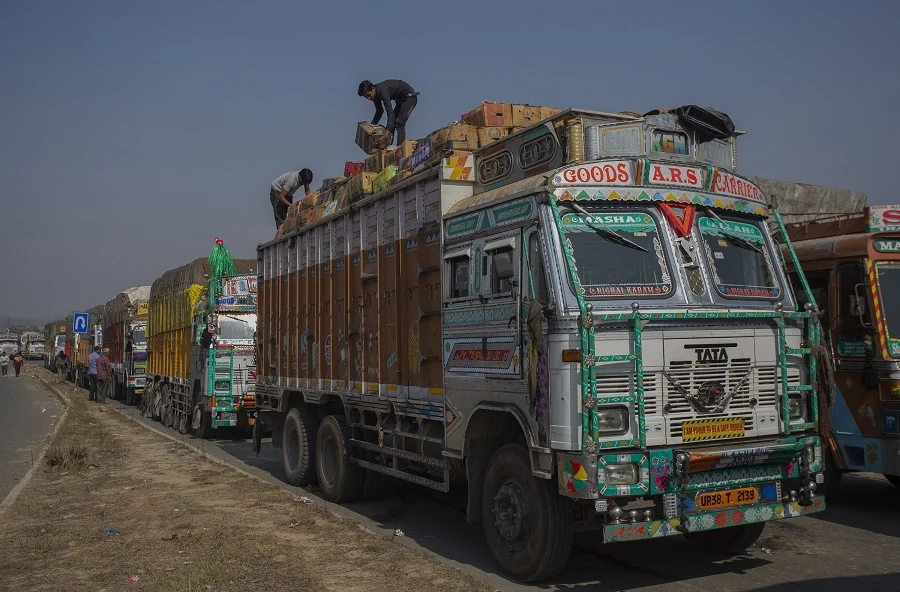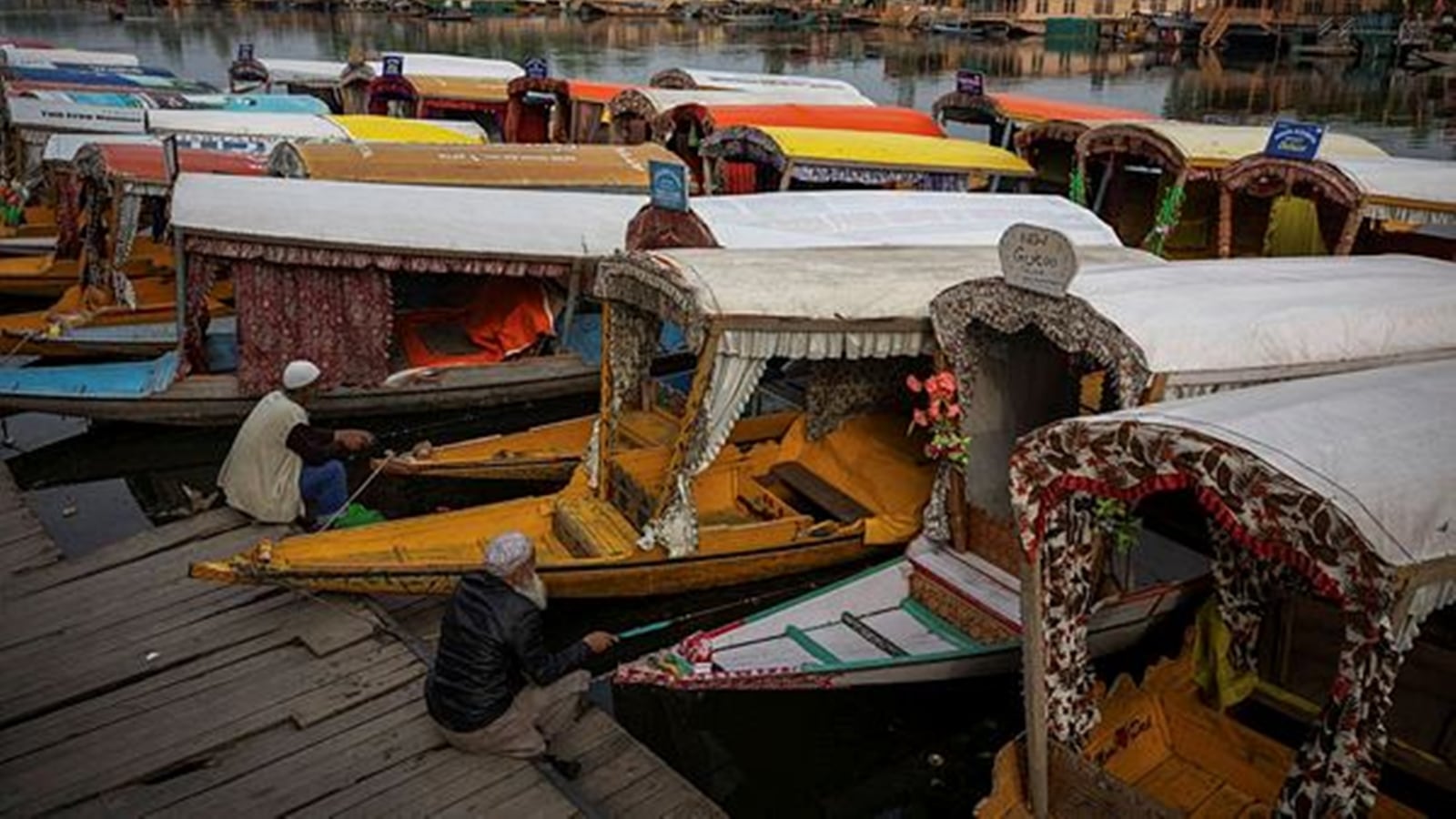Highway Blockade Paralyzes Kashmir’s Lifeline
By: Javid Amin | 10 September 2025
Kashmir’s Apples Bear the Brunt of Highway Blockade – A Valley Cut Off
For nearly 15 days, the Jammu–Srinagar National Highway (NH-44) — the only all-weather road connecting Kashmir to the rest of India — remained blocked by landslides, floods, and slope collapses. What might seem like just another road disruption in the Himalayas has instead triggered a rural economic emergency.
While thousands of travelers and truck drivers were stranded, the most severe blow fell on Kashmir’s apple industry, the backbone of its rural economy. With September being peak harvest season, truckloads of fresh apples rotted on the highway, inflicting losses estimated at ₹400–700 crore.
This feature unpacks the crisis in two parts:
-
The Highway Blockade & Its Wider Impact – timeline, stranded vehicles, suspension of the Mata Vaishno Devi Yatra, restoration work, and long-term concerns.
-
The Apple Crisis – economic fallout, Sopore Mandi slowdown, farmer voices, climate change impact, and what it means for Jammu & Kashmir’s economy.
Jammu–Srinagar Highway Blockade & Reopening
What Happened: Timeline of Closure
-
August 26, 2025 – Heavy rains triggered landslides across Jammu & Kashmir. The highway was first shut. Simultaneously, a massive landslide on the Vaishno Devi track near Adhkuwari killed 34 pilgrims and injured 20, forcing suspension of the Yatra.
-
August 30 – The highway was briefly reopened, allowing some vehicles to pass.
-
September 2 – A giant landslide at Thard–Jakheni in Udhampur buried a 550 x 300-metre stretch, closing NH-44 again.
-
September 7 onwards – The National Highways Authority of India (NHAI) launched round-the-clock restoration work.
-
September 10–11 – A 300-metre diversion road was completed. The highway partially reopened for light motor vehicles (LMVs). Heavy trucks were still not allowed.
Stranded Vehicles & Supply Chain Disruption
-
Over 4,000 vehicles were stranded across Kathua, Samba, Jammu, Udhampur, Ramban, Qazigund, and Srinagar.
-
Trucks carrying essential supplies — fuel, medicine, and foodgrains — could not reach the Valley.
-
Tourists and local passengers were stuck for days in Ramban and Banihal, depending on community kitchens for food.
The blockade transformed a transport disruption into a humanitarian bottleneck.
Religious Tourism Hit: Vaishno Devi Yatra Suspended
The Mata Vaishno Devi Yatra, one of North India’s largest pilgrimages, has remained suspended since the Adhkuwari landslide on August 26.
-
This marks the longest suspension in recent years — over 15 consecutive days.
-
Shrine authorities say restoration of the track and slope stabilization is underway. Resumption is expected mid-September after safety clearance.
-
The suspension has also affected local businesses — pony owners, shopkeepers, hotels, and transporters in Katra.
Restoration Efforts: Building a Road on War Footing
Restoration was not easy:
-
NHAI deployed hundreds of workers, bulldozers, and excavators.
-
Continuous rain and slope instability caused fresh cave-ins.
-
The key breakthrough was building a 300-metre diversion road around Thard–Jakheni.
Currently:
-
LMVs allowed both ways (Jammu → Srinagar, Qazigund → Jammu).
-
HMVs still restricted, as the road cannot yet bear their weight.
-
Other routes — Srinagar–Sonamarg–Gumri and Kishtwar–Sinthan–Anantnag — reopened. But the Batote–Doda–Kishtwar road remains blocked by fresh slides.
Economic & Policy Implications
-
Supply Chain Fragility – Every closure disrupts essentials and inflates prices in the Valley.
-
Tourism Loss – Pilgrimage suspension has hit religious tourism revenues.
-
Recurring Problem – Landslides on NH-44 are no longer rare events but an annual monsoon ritual.
-
Policy Questions – Why is the only all-weather link still so vulnerable? Should tunnels and bypasses be prioritized?
Former CM Omar Abdullah recently remarked:
“Our fruit economy and daily lives cannot remain hostage to an unstable road. We need permanent solutions.”
Kashmir’s Apple Industry in Crisis
The Apple Backbone of Kashmir’s Economy
-
Apple industry value: ₹12,000 crore annually
-
Supports: 3.5 million people
-
Share in J&K’s GDP: ~10%
-
Kashmir’s Sopore Fruit Mandi handles nearly 40% of all apple trade — making it the second-largest fruit mandi in Asia.
When the highway shuts, the entire chain — from orchard to consumer — collapses.
A Choked Artery: Trucks Full of Apples Stranded
-
Hundreds of trucks carrying apples were stuck at Qazigund, Anantnag, and Ramban.
-
Apples meant for Delhi’s Azadpur Mandi and other north Indian markets perished.
-
Early varieties like Babugosha pears, Gala Mast, and Red Gala rotted completely.
The Losses: Counting the Crores
-
Estimates suggest losses between ₹400 crore and ₹700 crore.
-
Prices at outside mandis dropped due to delayed, damaged arrivals.
-
Local Kashmiri markets faced oversupply, lowering prices within the Valley.
Thus, farmers were trapped in a double crisis:
-
No profits outside Kashmir.
-
No good rates inside Kashmir.
Voices of Distress
-
Bashir Ahmed, Chairman, Kashmir Valley Fruit Growers Union:
“This is the most difficult time we’ve seen in years. Farmers are helpless; their produce is perishing in trucks.” -
Apple Farmers Federation of India:
Warned of protests if freight costs are not regulated. Transporters are charging inflated rates due to scarcity of available trucks.
Floods & Landslides Compound the Crisis
-
South Kashmir orchards in Pulwama, Shopian, and Anantnag were damaged by August floods.
-
Soil erosion and waterlogging led to premature fruit fall.
-
Fungal diseases affected fruit quality.
The Mughal Road, though technically open, cannot handle the volume or weight of apple-laden freight trucks.
Why the Apple Economy is Extra Vulnerable
-
Single Highway Dependence – NH-44 is the only reliable route.
-
Perishable Nature – Apples can’t wait; without cold storage, they rot.
-
Weak Storage Infrastructure – Limited Controlled Atmosphere (CA) facilities.
-
Market Dependency – Apple rates depend on Delhi’s Azadpur Mandi. A few days’ delay crashes prices.
Climate Change: A Growing Shadow
Experts warn that climate change is worsening:
-
Unseasonal rains
-
Cloudbursts
-
Frequent landslides
This pattern is no longer an exception but a trend, threatening Kashmir’s status as India’s apple bowl.
Farmers’ Demands & Way Forward
-
Regulated Freight Costs – Prevent exploitation during crises.
-
Alternate Routes – Upgrade Mughal Road and other bypasses.
-
Cold Storage Expansion – Reduce dependence on highway timing.
-
Crop Insurance – Weather-indexed insurance to cover sudden losses.
-
Infrastructure Upgrade – Invest in tunnels, slope stabilization, and scientific road engineering.
Bottom-Line: A Rural Economic Emergency
The reopening of the Jammu–Srinagar highway brings some relief, but the crisis has already scarred Kashmir’s economy.
-
Pilgrims are waiting for safe resumption of the Vaishno Devi Yatra.
-
Farmers are counting their losses in hundreds of crores.
-
Truckers and traders are struggling with backlogs.
This is not just a transport crisis. It is a reminder of systemic vulnerability — an entire economy can be paralyzed by a single road closure.
Unless policymakers invest in resilient infrastructure, alternate routes, and farmer protection, Kashmir’s people will continue to pay the price — in lives, livelihoods, and lost opportunities.
At a Glance
| Factor | Status | Impact |
|---|---|---|
| Highway | Reopened for LMVs (Sept 10–11, 2025) | HMVs still restricted |
| Stranded Vehicles | 4,000+ | Supplies, fuel, food delayed |
| Vaishno Devi Yatra | Suspended 15+ days | Religious tourism halted |
| Apple Industry | ₹400–700 crore losses | Farmers devastated |
| Orchard Damage | South Kashmir | Floods + fungal diseases |
| Sopore Mandi | 40% trade slowdown | Prices crashed |
| Alternative Routes | Mughal Road open | Not suitable for heavy trucks |



